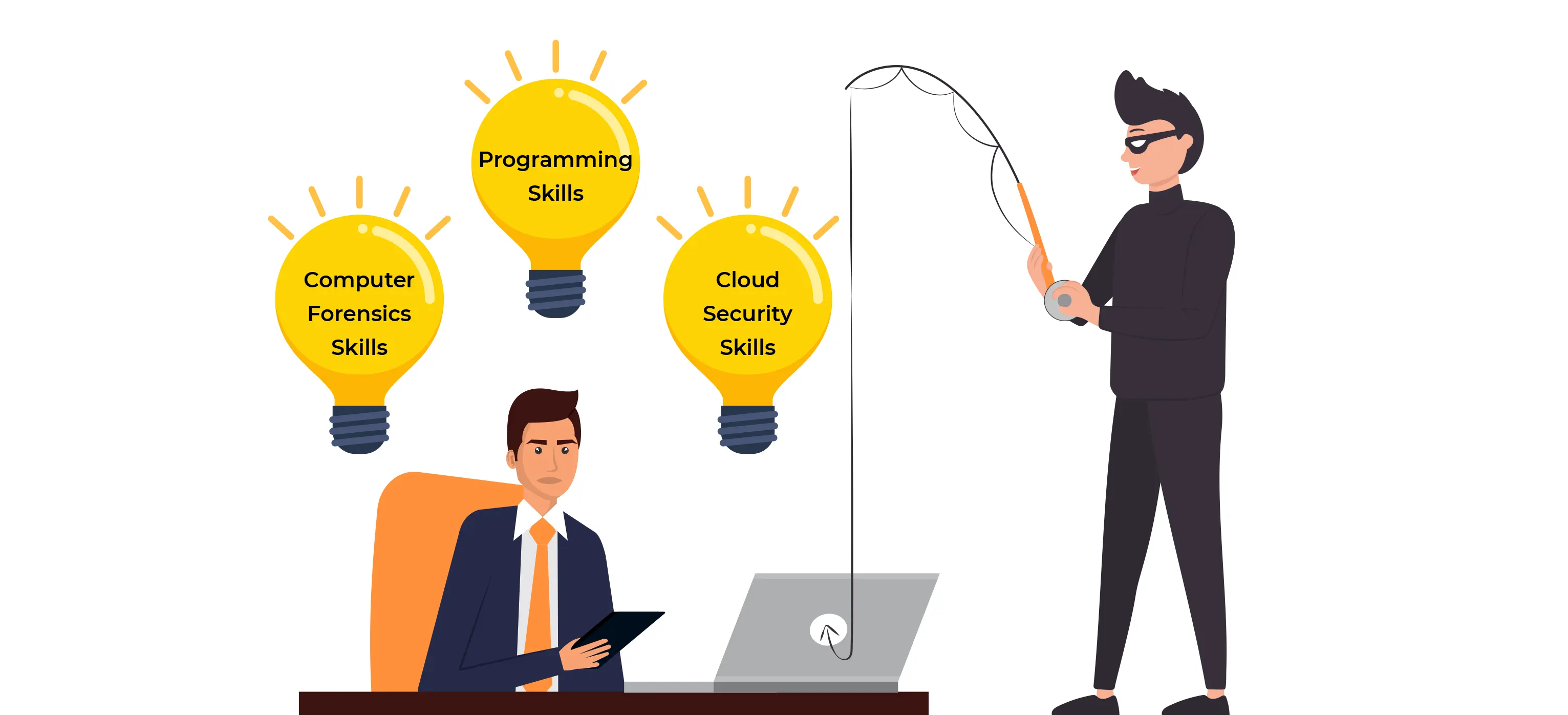 Satendra K
Jan 22, 2025
Satendra K
Jan 22, 2025

In-demand Cybersecurity skills such as Cloud Security, Penetration Testing, Ethical Hacking, Threat Intelligence, Incident Response, Governance, Risk, and Compliance (GRC), Cybersecurity Automation and Artificial Intelligence and Machine Learning skills, are crucial for becoming a sought-after and high-paid professional.
According to the ISC2 Cybersecurity Workforce Study, “90% of organizations have skills gaps within their security teams. Over one-third of respondents cited AI as the biggest skills shortfall in the teams, followed by cloud computing (30%), incident response (25%), application security and penetration testing (24%)’.
A huge opportunity for aspiring cybersecurity professionals!!!
Nonetheless! If your skill set doesn't include in-demand cybersecurity skills, you may be overlooked for valuable job opportunities. So, If you're looking to start or advance a career in cybersecurity, then make sure you have these in-demand cybersecurity skills!
To give you a competitive edge, here is a list of the top 6 in-demand cybersecurity skills with recommended certifications that will help you get into the field of cybersecurity.
Every sector including banks, tech companies, hospitals, or government agencies needs skilled cyber security professionals to protect their organisation. According to the World Economic Forum, there will be a cybersecurity workforce shortage of more than 85 million workers by 2030, further confirming the future demand for cybersecurity professionals.
If you wish to become a part of the ever-demanding cybersecurity workforce, then here are the top 6 in-demand cybersecurity skills you need to have;
Cybersecurity courses can help you acquire the above-mentioned in-demand cybersecurity skills. These courses equip learners with practical knowledge and hands-on experience to address modern security challenges.
Now let's take a brief look at these 6 in-demand Cybersecurity skills.
Cloud Security skills are one of the in-demand cybersecurity skills today. With the rapid adoption of cloud platforms like AWS, Microsoft Azure, and Google Cloud cloud security has become a critical area of focus. Cybersecurity professionals with expertise in cloud security are highly sought after to manage and mitigate risks in these environments.
Certifications like CompTIA Cloud+, CISSP, Certified Cloud Security Professional (CCSP) and AWS Certified Security can help you develop cloud security skills. These certifications can help you land jobs like Cloud Security Analyst, Cloud Security Consultant and Cloud Security Engineer.
Penetration testing, also known as ethical hacking, involves simulating cyberattacks to uncover vulnerabilities before malicious actors can exploit them. As cybersecurity threats become more advanced, organisations require skilled ethical hackers to proactively identify weaknesses in their systems.
Certifications like CompTIA Security+ and CEH v13 can help build foundational and advanced skills in ethical hacking. Edoxi also offers the best in class penetration testing courses for you to get started. These certifications can help you kickstart your career as a cybersecurity analyst or cloud security analyst, which often serves as the first line of defence against cybercrime.
Artificial Intelligence is a relatively new innovation that has been receiving widespread use over the past few years. AI is perfect for the cybersecurity sector, as it brings reliability and consistency to cybersecurity measures, and it helps security professionals identify suspicious activity and impart a greater understanding of the cyber environment.
AI-driven tools are becoming integral to threat prediction and anomaly detection. Professionals equipped to work with solutions like Darktrace, Cylance, and AI-enhanced SIEM platforms are at the forefront of cybersecurity innovation.
According to Satendra Singh Khari, senior corporate trainer at EDOXI
“The biggest advancement in cybersecurity has been the integration of Artificial Intelligence (AI) and Machine Learning (ML). These technologies have completely changed how we approach security by enabling real-time threat detection, behavioural analysis, and automation of repetitive tasks. They’ve made it possible to detect unknown threats, reduce false positives, and adapt defences to evolving attacks—all of which are game-changers in staying ahead of cybercriminals”.
Artificial Intelligence (AI) and Machine Learning (ML) skills are vital to organisations from new emerging cyber threats.
Certified Information Systems Security Professional (CISSP), AI training or CEH v13 can help you hone your in-demand AI skills.
|
PRO TIP Cybersecurity Threats to Expect in 2025Cybersecurity professionals should anticipate increasingly complex and targeted cyber threats, including ransomware, AI-driven attacks, and cloud security vulnerabilities. The demand for skilled cybersecurity experts will only continue to rise as these threats evolve. |
As cyber threats become more sophisticated, threat intelligence and incident response skills are increasingly valuable. These skills focus on understanding potential threats, responding to security incidents, and mitigating damage after a breach occurs.
Certifications like CompTIA Security+ and Certified Ethical Hacker (CEH), Incident Handling course, Certified Threat Intelligence Analyst (CTIA) and GIAC Certified Incident Handler (GCIH) can help build foundational and advanced skills in ethical hacking.
Cybersecurity professionals are not only responsible for protecting data but also ensuring that organisations comply with laws, regulations, and internal policies. GRC skills are crucial for managing risks and ensuring that organisations are aligned with regulatory frameworks like ISO 27001, GDPR, and HIPAA.
Certifications like Certified in Governance, Risk and Compliance (CGRC), Certified in Risk Information Systems Control (CRISC), and Certified Information Systems Auditor (CISA) can help you develop the Governance, Risk, and Compliance (GRC) Skills. You can also get compliance awareness and become a white hacker through an Ethical Hacking Preparatory Course.
With the increasing complexity and volume of security data, automation is becoming critical for organisations to stay ahead of cyber threats. Automation skills can help cybersecurity teams scale operations and respond faster to incidents.
Certifications like CEH V13, CISSP, OSCP and CYSA can help you develop Cybersecurity Automation Skills.
Cybersecurity professionals need to be familiar with the latest tools to effectively address today's challenges. Below are some of the most in-demand tools used by cybersecurity experts:
Cybersecurity is a dynamic and ever-changing field, and mastering the in-demand cybersecurity skills listed above will prepare you for the challenges of tomorrow. The shortage of qualified cybersecurity experts presents an excellent opportunity for those entering or advancing in the field. By joining top courses to upskill in cybersecurity, gaining hands-on experience with cutting-edge tools and obtaining certifications, you’ll be well-equipped to tackle the most pressing cybersecurity challenges.
If you're committed to taking your cybersecurity career path to the next level, now is the perfect time to take action. The skills you develop today will ensure you're prepared for tomorrow's cyber challenges.

Chief Technology Officer & Cyber Security Expert Trainer
Satendra Singh Khari is a renowned cybersecurity expert and the Chief Technology Officer at Edoxi, where he leads the CEH v13 AI program. With over 12 years of experience, he has trained more than 10,000 professionals and earned recognition in the Circle of Excellence for 2023 and 2024. Mr. Khari holds multiple industry certifications, including CISSP, CISM, CEH, CPENT, and CREST, which showcase his expertise in vulnerability assessment, penetration testing, and incident handling.
His practical insights, gained during his tenure as Head of Information Security in Malaysia, enhance the learning experience by providing students with essential technical skills and a clear path to career advancement. Recognized as a leader in his field, he has received the Internet 2.0 Outstanding Leadership Award for three consecutive years (2022-2024), reflecting his dedication to empowering the next generation of cybersecurity professionals.